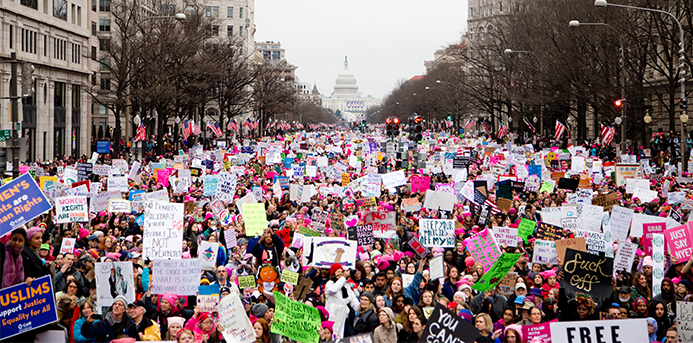It’s been a long year since the first, record-breaking Women’s March on Jan. 20, 2017. Millions of people filled the streets that January day, and this year’s marches were as strong as ever. Hundreds of thousands of people marched in New York, Chicago, and Los Angeles. Marchers in our nation’s capitol (and across the country) had a new message this year — one of action, whether it be running for office or making sure to vote in every possible election. Since the November 2017 presidential election, women have begun running for office in record numbers. According to The Hill, more than 15,000 women have contacted the nonpartisan organization She Should Run since Donald Trump’s election. And more than 20,000 women have sought guidance from the organization EMILY’s List, which supports the campaigns of pro-choice Democratic women. On the ground in D.C., we talked to the women of this year’s march about what this past year has been like and what they see looking forward.
Jan Marie Steele
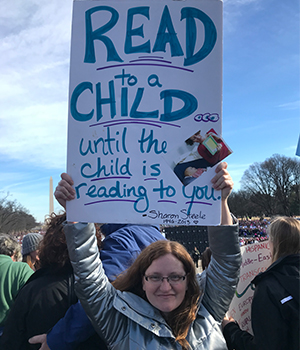
“It’s really important to me that people recognize that going to the polls is crucial in times like these. Someone just said, ‘Hello activists,’ and I answered, ‘Yeah!’ I did not answer to that before. I knew that I had strong political feelings but I didn’t know it was my job to be here. And then after four days of crying after the election, I knew that it was my job to help restore faith in humanity and to trust strangers … all of this together, I absolutely identify as an activist now. I hate the current political situation but I love that this critical activism has come to life again in America, that we are not sitting back and watching this happen, that we are recognizing that it’s up each of us to stand here, to be seen, to be heard. It doesn’t matter how shaky your voice is.”
Marie Jo Binet
*pictured right
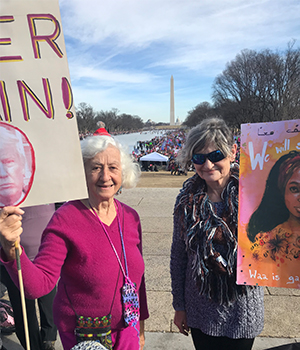
“I’m worried about a lot of things. I know people personally who are waiting for a visa to come to the states and have been waiting forever. I know people who live on Social Security, and I do, and we don’t know where this is going to go. And now with DACA, we’re supposed to send children back to a country they don’t even know? It’s endless, and it’s absurd.”
Amaria Savage, Sarah Stroppe, Rhea Rao, Julia Robson
*pictured left to right
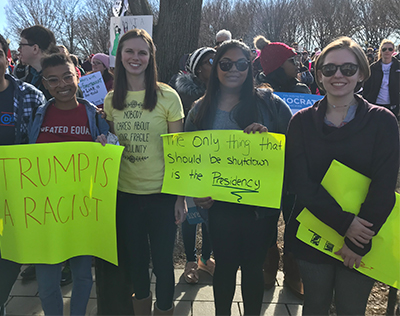
Julia: “What’s changed for me is that my eyes have opened to all of the bull-crap that’s happening and all the sexism and misogyny that’s so ingrained in our culture. We should change it.”
Rhea: “My passion to be proud of what I believe in has definitely increased through all of these movements. It’s really taught me that when people come together it can turn into a beautiful thing.”
Sarah: “Because so many more women are coming out and telling their stories, I feel inspired as well. I think it’s really coming together and creating a huge movement for women.”
Amaria: “I wasn’t able to attend the first Women’s March, but I think from the standpoint that I was just experiencing and seeing all the different movements that have been occurring has really ignited a kind of spark within myself to become more involved in a movement that I see is really doing something for a greater good, for humanity, not just for femme people and female bodies, but for other people who are marginalized in our community. I feel like Trump’s presidency, while it was something that many of us did not want, it definitely does do something to encourage people who maybe weren’t involved in politics to become involved.”
Sophia Duchin
“Last year when I saw the Women’s March, I was absolutely floored by how many people came out and supported it. It just really showed me and opened my eyes to the fact that these were issues I’ve cared about my entire life and that affect my life. Until that Women’s March last year, I didn’t realize how powerful everyone was when they were united and stood up for what they believed in. I was devastated by the fact that Trump got elected, and in the past year I’ve been to so many more protests and gotten more involved. I think it’s made me realize that I’m capable of creating change myself.”
Daejah Fontain
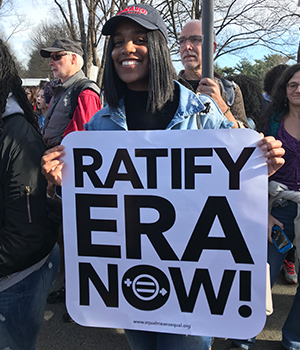
“Not much has changed for me [in the past year]. I’m new to D.C., this is my first march, I’m excited to be here. What has changed for me is that nothing has really changed, they’re just more open with their racism and bigotry and how they’re against LGBT and abortion. [But] all these people here are here for the same reason, to make change. I’m a poli-sci major at Howard University and I want to be really involved with politics and make changes because I want to become the first woman senator of Pennsylvania.”
If this new wave of activism is inspiring you to run for office too, now’s your time! For support and resources, check out She Should Run and Putting Women in Their Place, two organizations committed to getting more women into elected office.
More from Make It Better:
- Women Are Changing the Face of Philanthropy (And You Can Be Part of It)
- Join Our Better Giving Circle to Support Your Favorite Nonprofit and Enjoy an Exclusive Dinner
- Metropolitan Planning Council President MarySue Barrett’s 5-Step Recipe for a More Successful Chicago
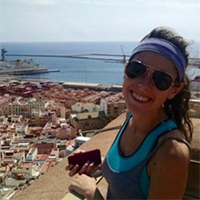
Jessica Suss is a native Chicagoan residing in Washington, D.C. She is currently getting her master’s degree in secondary English education at the University of Maryland. She enjoys petting other people’s dogs and is faithful to Lou Malnati’s alone. Jessica is also a supporter of MAZON and No Kid Hungry.
